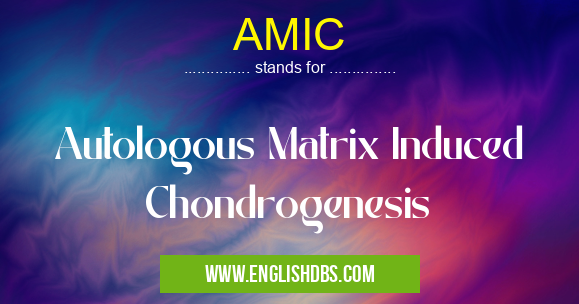What does AMIC mean in UNCLASSIFIED
Autologous Matrix Induced Chondrogenesis (AMIC) is a novel and groundbreaking surgical technique that has revolutionized the treatment of cartilage defects in the knee. This innovative procedure utilizes the patient's own cells and tissues to regenerate damaged cartilage, offering a promising and effective alternative to traditional surgical approaches.

AMIC meaning in Unclassified in Miscellaneous
AMIC mostly used in an acronym Unclassified in Category Miscellaneous that means Autologous Matrix Induced Chondrogenesis
Shorthand: AMIC,
Full Form: Autologous Matrix Induced Chondrogenesis
For more information of "Autologous Matrix Induced Chondrogenesis", see the section below.
AMIC Meaning
AMIC stands for Autologous Matrix Induced Chondrogenesis. It involves utilizing the patient's own chondrocytes (cartilage cells) and a collagen scaffold to stimulate the growth of new cartilage tissue. The procedure is minimally invasive and typically performed arthroscopically, minimizing tissue damage and promoting faster recovery.
AMIC Procedure
The AMIC procedure involves the following steps:
- Harvesting cells: Chondrocytes are extracted from a healthy area of the patient's cartilage.
- Preparation of scaffold: A collagen scaffold is prepared to serve as a growth template for the new cartilage tissue.
- Implantation: The chondrocytes are combined with the scaffold and implanted into the defect area.
- Stimulation: The scaffold acts as a chemoattractant, attracting surrounding cells to promote tissue regeneration.
Advantages of AMIC
AMIC offers several advantages over traditional cartilage repair techniques:
- Autologous cells: Uses the patient's own cells, reducing the risk of rejection and promoting tissue integration.
- Biologic scaffold: The collagen scaffold provides a natural environment for chondrocyte growth and differentiation.
- Minimally invasive: Performed arthroscopically, minimizing tissue damage and promoting faster recovery.
- Durable results: Studies have shown that AMIC can produce long-lasting cartilage regeneration, improving joint function and reducing pain.
Essential Questions and Answers on Autologous Matrix Induced Chondrogenesis in "MISCELLANEOUS»UNFILED"
What is Autologous Matrix Induced Chondrogenesis (AMIC)?
AMIC is a surgical technique that uses a patient's own cartilage cells to repair damaged cartilage in the knee. It involves removing a small sample of healthy cartilage from the knee, processing it in the laboratory to extract the cartilage cells, and then using these cells to create a new cartilage graft. The graft is then implanted into the damaged area of the knee to promote cartilage regeneration.
Who is a candidate for AMIC?
AMIC is typically recommended for patients with focal cartilage defects in the knee, particularly those that are small to medium in size. It can be an effective treatment option for patients who have failed conservative treatments such as physical therapy or injections. AMIC is not suitable for patients with large or severe cartilage defects, or those with underlying cartilage disorders.
What are the benefits of AMIC?
AMIC offers several potential benefits, including:
- Uses the patient's own cells, reducing the risk of rejection.
- Promotes the growth of new, healthy cartilage.
- Can improve knee function and reduce pain.
- May delay or prevent the need for more extensive surgery.
What are the risks associated with AMIC?
As with any surgical procedure, AMIC carries some risks, including:
- Pain, swelling, and stiffness after surgery.
- Infection.
- Failure of the graft to take.
- Need for additional surgery. However, the overall风险 of complications from AMIC is relatively low.
What is the recovery process like after AMIC?
Recovery from AMIC typically involves:
- Using crutches or a walker for several weeks.
- Physical therapy to regain range of motion and strength.
- Avoiding high-impact activities for several months. Most patients experience significant improvement in their knee function within 6-12 months after surgery.
Final Words: AMIC is a promising and effective surgical technique for the treatment of cartilage defects in the knee. Utilizing the patient's own cells and tissues, AMIC promotes the growth of new cartilage tissue, offering a viable alternative to traditional surgical approaches. With its minimally invasive nature and potential for long-lasting results, AMIC is revolutionizing the field of cartilage repair and improving the quality of life for patients suffering from cartilage damage.
